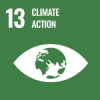Environmental pollution due to plastic waste is a common challenge. Pollution by plastic waste is in line with the exponential production of plastics on a global level. The plastic itself is widely used in the industrial manufacturing sector and in the process of making products for daily activities.
“In the current marine environment, 85 percent of marine waste is dominated by plastic waste. This is due to the plastic waste carried by the water flow, one of which is through the river,” said Dr. Andhika Puspito Nugroho, lecturer and environmental researcher at the Faculty of Biology, UGM in BioTalks, Friday (11/6).
Microplastics are plastic particles/fragments that have a size below 5 mm and are resistant pollutants. There are two kinds of microplastics, namely Primary Microplastic which usually contains care products such as shower gel, paint, detergent, and cream. Microplastics that are in the oceans today come from daily activities on land. The second type is Secondary Microplastic which is the result of the degradation of plastic waste. These microplastics are currently polluting marine organisms and have entered the food chain where humans are the top consumers.
“Microplastics are often considered as food by various organisms in the sea. Thus, microplastic pollutants can interfere with the health of marine organisms. They can move from the digestive system into the circulatory system of marine organisms,” added Andika.
Wahyu Marjaka, Director of Sectoral Resource Mobilization and Regional Director General of Climate Change Control, explained that improperly regulated biodegradable plastics often cause microplastic problems. As such, a plastic degradation process causes microplastic pollutants in the environment.
Plastic waste is an issue that must be shared, starting from education by academics, regulations by the government, to the awareness of each individual.
“From 2015 until now, the government continues to encourage people to do 3Rs and implement policies that aim to achieve the SDGs Goals,” said Wahyu.
Wahyu also said that personal habits to deal with plastic waste also need to be encouraged, such as getting used to eating without plastic utensils, reducing single-use waste, and taking small steps to reduce waste by reuse.
“Academics, government, and society are aware of waste issues. However, these steps must be followed by a sustainability commitment,” said Wahyu.



